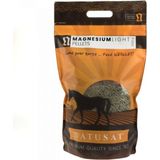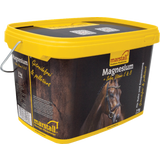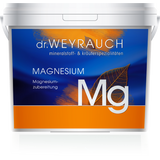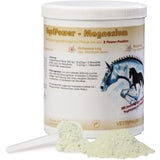The Importance of Magnesium for Horses
Magnesium is an important mineral for horses because it is involved in numerous functions in the body. Below are the top 10 reasons why horses need sufficient magnesium in their diet:
- It works closely with calcium to maintain muscle function. When the muscles are supposed to contract, calcium is released for this purpose and migrates to the muscle fibres. Magnesium stops the contraction by pushing back the calcium.
- By allowing the muscles to relax, it can aid recovery and help relieve muscle pain and cramps in animals after hard work.
- This mineral can have a performance-enhancing effect on horses by supporting muscle oxygenation, muscle strength and metabolic processes.
- Magnesium helps nerve cells transmit signals to each other and to the muscles.
- It is thought to have a calming effect on horses, helping to relieve muscle tremors and nervousness.
- It can improve stress tolerance and resistance to disease and injury. Stress causes magnesium to be used up more quickly in the body. Ensuring optimal magnesium intake can help speed the return to homeostasis after an external stressor.
- Magnesium can contribute to normal fat distribution in horses.
- Magnesium helps cells respond to insulin.
- It helps prevent laminitis, especially in horses that are more prone to laminitis in the spring. (Horses with laminitis are often found to have low levels of this mineral in their blood). Magnesium also helps protect against inflammation and free radical damage.
- Optimal magnesium levels help absorb calcium from the diet. This can support healthy bones and your horse's overall well-being.
Magnesium Deficiency in Horses
The good news is that chronic magnesium deficiency in horses is unlikely. However, a mild to moderate deficiency can occur, which can affect mood and performance. Horses that do not receive adequate amounts of this mineral in their feed may only show signs of deficiency during stress or competition.
Most signs of magnesium deficiency are related to impaired nerve or muscle function. Possible symptoms of this are:
- Nervousness/excitability/anxiety.
- Inability to relax or concentrate
- Muscle tremors, cramps, twitches, pain
- Intolerance of long working hours
- Highly sensitive to sounds or movements
- Hypersensitive skin
- Irritable moods
- Resistance to exercise
- Fatigue
- Irregular heartbeat
- Teeth grinding
- Increased sweating
The best way to find out if your horse is likely to be deficient in magnesium is to analyse the feed. A blood test is unlikely to be conclusive as blood magnesium levels are kept within a narrow range.
Often fast-growing grasses are low in magnesium. Such grasses are also likely to be low in sodium and high in potassium, which can exacerbate a deficiency. Other dietary factors can affect the absorption and assimilation of magnesium in the body. High amounts of fibre, oxalates, phosphates and fat in forage can reduce absorption in horses. Forage grown on acidic or clay soils may also be low in magnesium throughout the year.
In addition, the composition of the forage can influence the magnesium content in horses, as digestibility varies depending on the forage. Alfalfa has the highest magnesium digestibility at 50%, while cereals have the lowest at 38%. Horses that eat a lot of cereals may therefore be more susceptible to a deficiency of this important mineral.
Types of Magnesium Supplements
Magnesium is present in varying amounts in forages and cereals. Concentrated feed may or may not contain extra magnesium depending on the amount of other ingredients. The amount of indigestible fibre and the presence of oxalates affect the availability of magnesium in feeds. Supplemental magnesium can be either inorganic (magnesium sulphate or magnesium oxide) or organic (chelated magnesium).
Magnesium oxide is probably the most commonly used source and has an absorption rate of about 50%. The advantage of magnesium oxide is that the body does not absorb it unless there is a deficiency, so it is difficult to overdose a horse with it. Magnesium sulphate (Epsom salt) is also highly available to the horse for absorption, but it also has the effect of drawing water into the intestine and causing diarrhoea, so it is not recommended for daily use.
Feeding
It is always best to adjust the mineral content in your horse's diet with veterinary advice.
As a general rule, it is advisable to spread the dosage of supplemental magnesium over two meals per day to minimise the risk of digestive disorders such as diarrhoea.
The risk of overdosing is very low when you feed your horse extra magnesium. Excess magnesium is quickly excreted in the urine, so it does not normally accumulate to dangerous levels in the horse's body. However, giving high doses can cause diarrhoea.
In general, it is more important to maintain an adequate calcium-magnesium ratio than to worry about an excess of magnesium.
We can recommend the following magnesium products for horses from our shop:
Powder:
Pellets:
Related products
-
 4.6 (11)
4.6 (11)NATUSAT Magnesium Pellets, Light, 2.500 g
- Natural magnesium fumarate
- Optimised with vitamin B1, B2 & B6
- Easily digestible
£48.50 (£19.40 / kg)Delivery by February 12
-
 5.0 (1)
5.0 (1)Marstall Magnesium, 3 kg
-10%- With organic magnesium & selenium
- Plus vitamin B & vitamin E
- For stressful situations
£86.78 £96.50 (£28.93 / kg)Delivery by February 18
-
 4.9 (10)
4.9 (10)Dr. Weyrauch Mg Magnesium, 2.500 g
- Purely organically bound & highly available
- Tasty
- Supports magnesium deficiency
£124.00 (£49.60 / kg)Delivery by February 12
-
 4.6 (26)
4.6 (26)EquiPower Magnesium, 750 g
-9%- Magnesium & vitamin B12
- Promotes serenity
- Supports good performance
£19.02 £21.00 (£25.36 / kg)Delivery by February 12
Magazine Articles:
-
Great Britain: Free standard delivery from £79.90
-
Free
returns -
We operate in a
climate-conscious manner. More than 10.350 products
